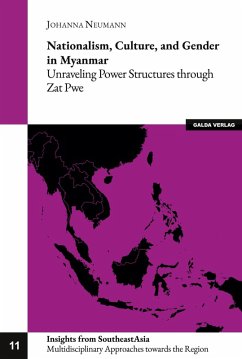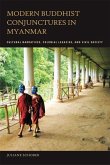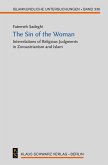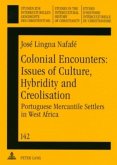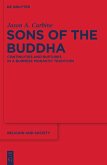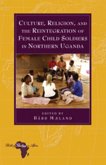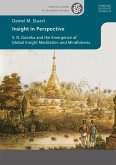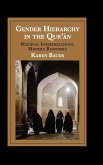This book employs zat pwe -a popular performance art event-to examine how nationalist concepts of culture and gender shape and sustain power relations in Myanmar society. The focus is on the performance events, including the ten-hour nightly shows, the professional troupes that stage them, the Bama-speaking village and ward communities that organise and attend them, and the absent intellectuals who discuss them. Drawing on ethnographic fieldwork with several traveling zat troupes based in Mandalay, but performing across various states and regions, as well as with residents of different wards in Mandalay, the study uncovers a nationalist discourse that reaches beyond political arenas and into the everyday life of Bama society. This discourse is transmitted through concepts of culture and gender that influence the power dynamics between the educated elite and ordinary citizens, as well as between men and women. The research illustrates how these concepts, embedded in nationalist discourse, intersect with one another and with ideas from other discourses, reinforcing hierarchical relations. By focusing on zat pwe events, this book sheds light on a significant yet frequently overlooked aspect of Bama society, precisely due to the very power structures under examination.ABOUT THE SERIESDevelopments in the field of area studies - goaded by the analytical deconstruction of world regions as such - have deeply affected the knowledge production on societies and cultures located in these politicized compartmentalization of the globe.With this series, the editors and authors wish to contribute to a reformulation of area studies that emphasizes the continuing epistemic value of contextualized knowledge production that is firmly rooted in concrete places.Starting with the notion of Southeast Asia, books published in this series will contribute to a more nuanced understanding of regionality based on a multidisciplinary approach.The series represents an oulet for young scholars intending to publish their degree theses and dissertations; and for established scholars who are looking for a place to republish out-of-print books, edited volumes or themed collections of their own papers and articles.We also invite scholarly collectives to publish collaborative works or edited volumes on topics that usually will not attract the attention of big presses due to their transdisciplinary orientation or the niche character of their topic.Our overall motivation is to maintain Southeast Asian studies as a critical and self-reflexive academic field.EDITORIAL BOARDDr. Benjamin Baumann, Chief EditorPD Dr. Daniel BultmannProf. Caroline S. HauProf. Vincent HoubenProf. Peter A. JacksonProf. Guido SprengerProf. Barend Jan TerwielDr. Xue Li
Hinweis: Dieser Artikel kann nur an eine deutsche Lieferadresse ausgeliefert werden.
Hinweis: Dieser Artikel kann nur an eine deutsche Lieferadresse ausgeliefert werden.

